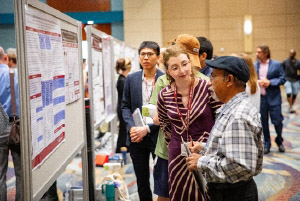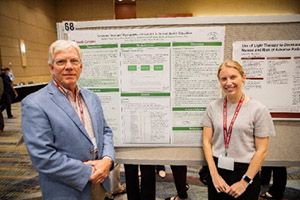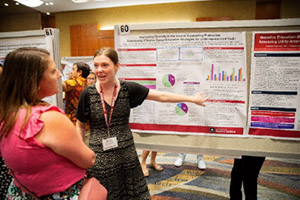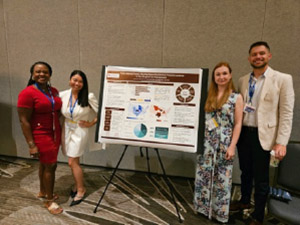Program: Genetic Counseling. The School of Medicine Columbia's (SOMC) Genetic Counseling Program, established in 1985 as the first in the Southeast, offers a rigorous two-year Master of Science curriculum accredited by the Accreditation Council for Genetic Counseling. The program prepares students to integrate genetic knowledge with counseling skills to support individuals and families facing inherited conditions. Through a combination of academic, clinical, and research experiences, it aims to develop compassionate and competent genetic counseling professionals. The program maintains a strong record of job placement, with graduates consistently securing positions soon after completing their degree.

Title: Newborn Screening for X-Linked Adrenoleukodystrophy: Experiences, Perspectives, and Future Directions for Genetic Counseling
Presenter: Sophia Salvatore, MS
Advising Committee: Morgan Driver, PhD, CGC; Jennifer Sullivan, CGC; Amy Gaviglio, CGC; Marianna Raia, CGC
There is a notable lack of research regarding genetic counseling practices for infants with screen-positive results for X-linked adrenoleukodystrophy (X-ALD) via newborn screening (NBS). The exploratory study aimed to understand the experiences of genetic counselors providing follow-up care for these infants, assess the complexities associated with NBS for X-ALD, identify potential gaps in genetic counseling practices, and describe the subsequent impact on patient care. Participants emphasized a need for long-term follow-up strategies, enhanced multidisciplinary collaboration, and increased involvement of genetic counselors in NBS policy. As NBS continues to expand, this study provides critical insights into the evolving role of genetic counselors and the necessity of refining long-term follow-up to ensure equitable and effective patient care.
Program: Counseling & Rehabilitation. The SOMC's Master of Arts in Counseling and Rehabilitation is designed to prepare students for professional counseling roles with a focus on supporting individuals facing physical, mental, developmental, or cognitive challenges. Students can specialize in Clinical Rehabilitation Counseling, Clinical Addiction Counseling, or Career Counseling, with each track meeting South Carolina’s academic requirements for licensure and national certifications.
Title: Graduate Students’ Perception of Using ChatGPT in Counseling and Mental Health: The Benefits and Challenges
Presenters: Hayden Petee, MA & David Tussey, BA

Advising Committee: Robert David Dawson, PhD, CRC & Patrick Demery, BA
Artificial intelligence (AI) has significant potential to transform healthcare, particularly in the mental health field. AI, which involves the simulation of human intelligence by machines or systems , has shown promise in raising awareness, assisting with diagnoses, and supporting interventions for various mental health disorders, including mood disorders, autism spectrum disorder, and schizophrenia (Thakkar et al., 2024). However, views on AI's effectiveness, reliability, and ethical implications vary widely among healthcare professionals and the general public. Our findings suggest that AI could significantly benefit counselor education by helping to develop these essential skills. Furthermore, respondents expressed strong support for integrating AI into the educational process, underscoring its potential to enhance skill development and learning.
Program: Genetic Counseling
Title: Increasing Diversity in the Genetic Counseling Profession: Determining Effective Career Education Strategies for Underrepresented Youth
Presenter: Bryel Frasch, MS
Advising Committee: Leta Tribble, PhD, Michelle Wyatt, PhD, Daniella Cook Sumpter, PhD, & Shandrea Foster, MS, CGC

Genetic counseling is a professional career path that is lacking in diversity, and diversity in healthcare has been shown to improve health outcomes. Studies suggest student engagement as a way to increase diversity. , as early knowledge of genetic counseling increases the likelihood of considering it as a career and is especially true for racial or ethnic minoritized students. Our findings suggest future inclusive outreach efforts should include working with high school programs, conducting an in-person presentation as it is more engaging, giving background context about DNA and genetics, and incorporating direct experiences from genetic counselors, and allowing time for questions about general genetics. The future implication of this study could assist those passionate about diversifying the genetic counseling field with insight into the most productive educational methods to reach high school students interested in genetic counseling as a career path.
Program: Doctorate of Nurse Anesthesia Practice. The SOMC's Nurse Anesthesia Program provides a Doctor of Nurse Anesthesia Practice (DNAP) degree, preparing students to become Certified Registered Nurse Anesthetists (CRNAs) through a combination of online coursework, in-person simulation, and diverse clinical experiences. Graduates are eligible to sit for the National Certification Exam and benefit from a strong employment rate, with 100% of the Class of 2024 securing positions within six months of graduation.
Title: Policy-Related Factors Affecting Nurse Anesthetists’ Practice Locations in Non-Surgical Pain Management

Left to right: Dr. Sheena Morris, Van Huynh, Svetlana Martin, Logan Brown.
Presenters: Logan Brown, DNAP, Van Huynh, DNAP, &Svetlana Martin, DNAP
Advisor: Sheena Morris, DNAP, CRNA
This cross-sectional quantitative study examines how specific policy-related factors, such as physician supervision requirements, opt-out status, and fluoroscopy utilization, influence the practice location choices of NSPM-certified CRNAs in the United States. The findings indicate that state policies significantly influence NSPM CRNAs’ practice locations. This study provides valuable insights for policymakers aiming to expand NSPM services by highlighting the need for regulatory reforms that support CRNA autonomy and scope of practice at local, state, and national levels.